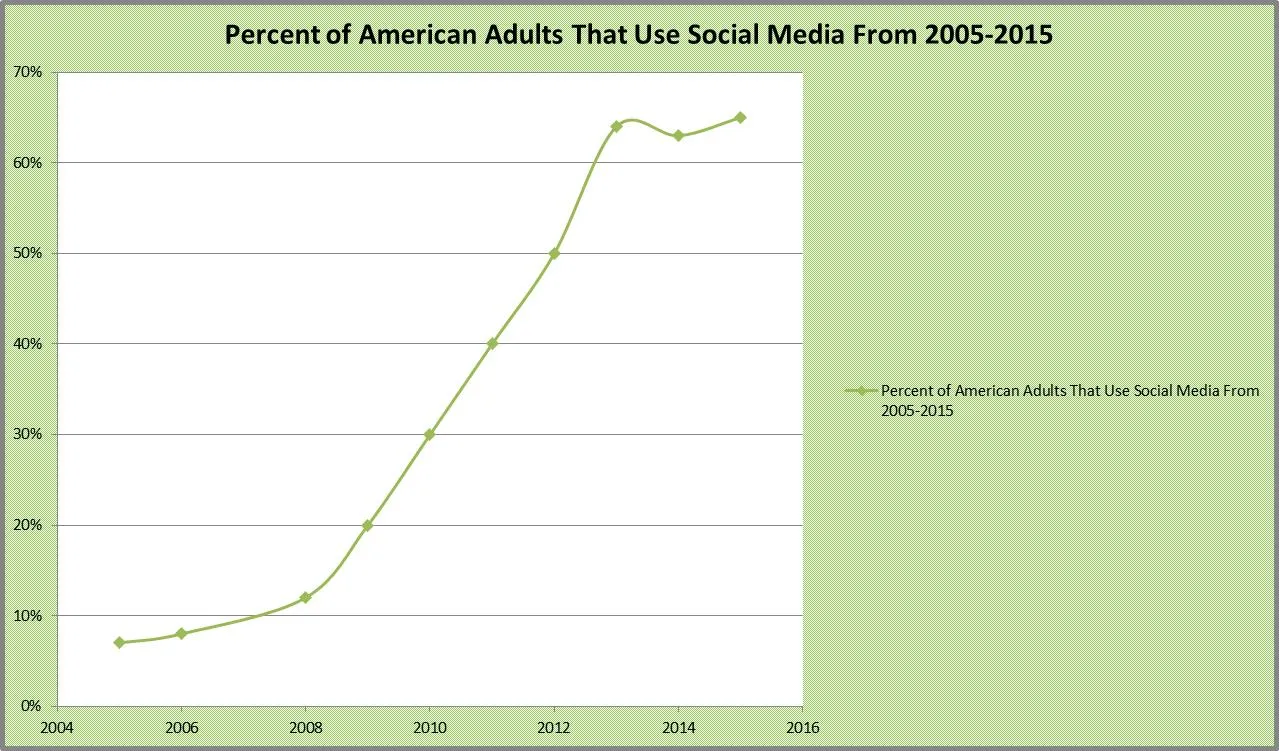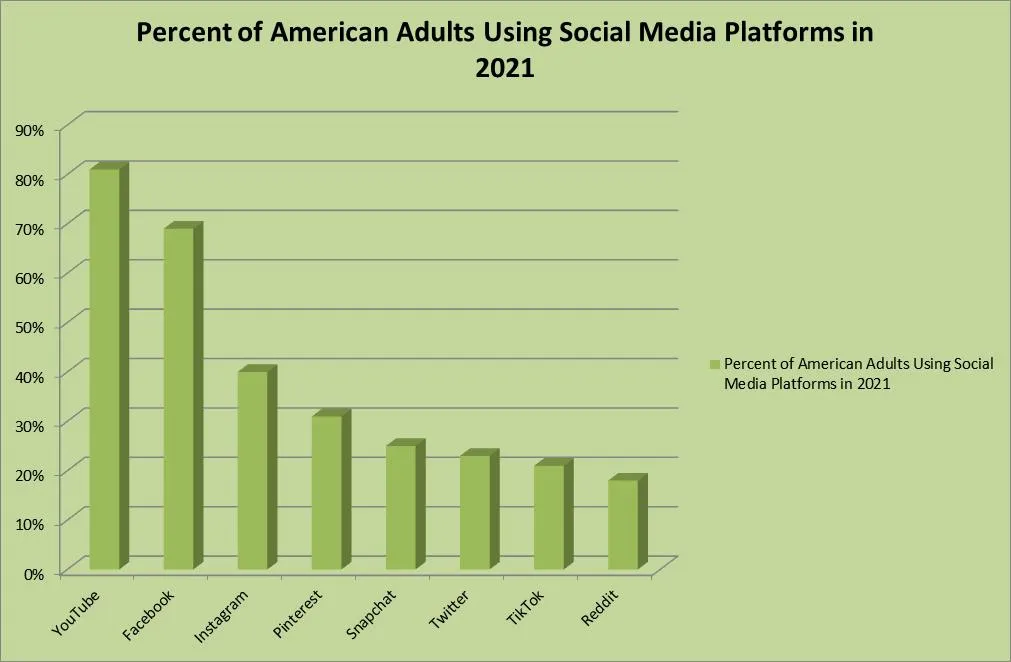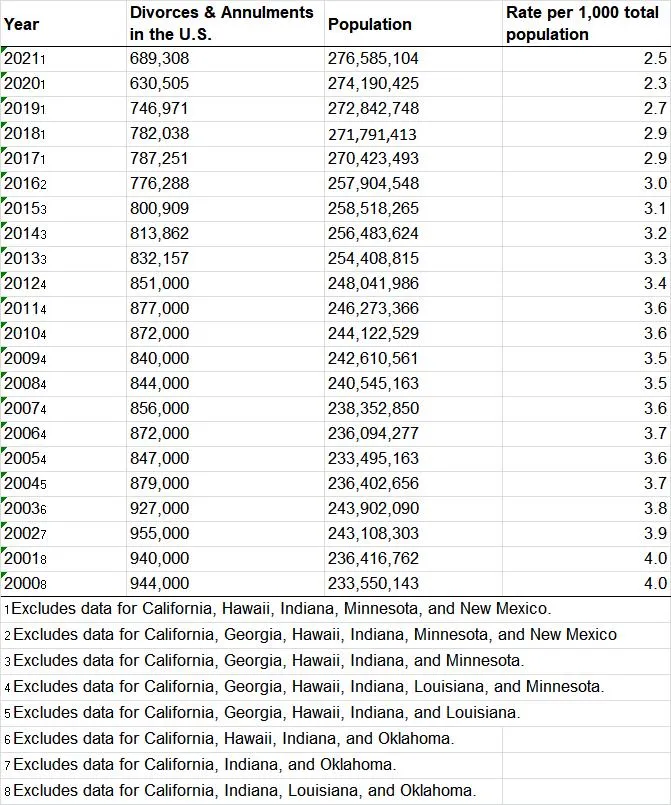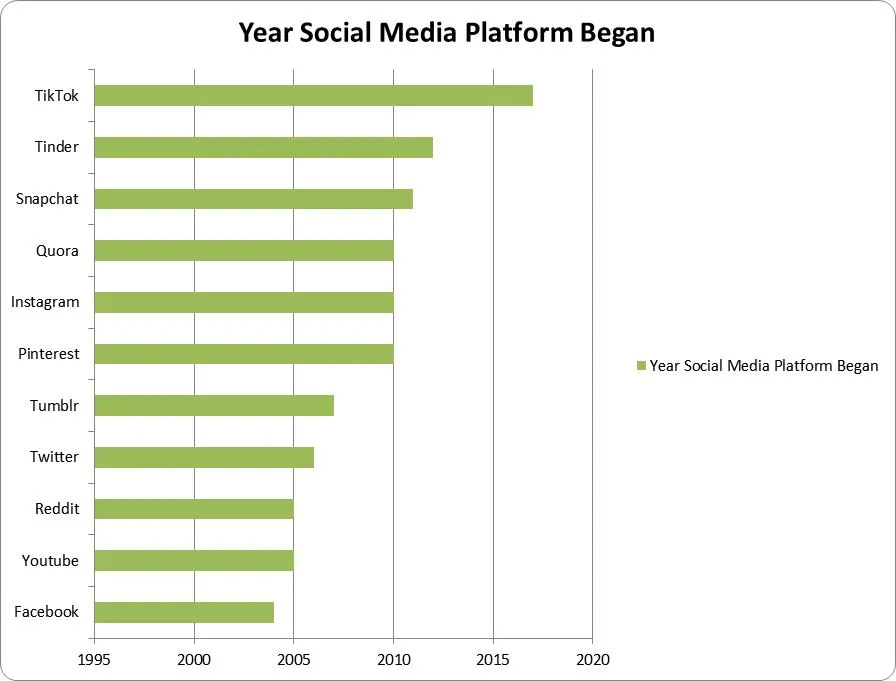Shocking Statistics: Social Media's Alarming Impact on Divorce Rates
by SKU
Published: Mar 6, 2023 | Updated: Jun 6, 2023 |

Sharing is Caring!... Don't Care, Share & Save
Shocking Statistics: Social Media's Alarming Impact on Divorce Rates
Have you ever wondered how social media impacts romantic relationships and married couples? According to a new study published in the Journal of Cyberpsychology, Behavior, and Social Networking, social media use can lead to many divorces and have a significant impact on marriage quality. The study found that excessive Facebook use, including emotional infidelity, posting frequently, and checking one's partner's posts, can lead to communication problems and ultimately harm the relationship.
Married couples, including spouses, must understand the potential impact of social media on their relationships. With the internet playing an increasingly important role in modern relationships, emotional infidelity has become a common problem among Facebook users, leading to many divorces. It is essential to consider the effects of social media on marriages to prevent such issues from arising. Let us delve deeper into this topic to gain insights into its importance.
When did Social Media Start?
The data indicates that the most popular social media platforms started between 2004 and 2017. Facebook started in 2004 and TikTok in 2017.
The following chart shows what year each of the more popular social media platforms began.
Social Media Usage Between 2005 and 2021?
The data indicates that by 2015, 65% of American Adults where using at least one social media platform, and by 2021, 80% of American adults where using YouTube, and 68% were using Facebook. The following chart shows the percentage of American Adults that used social media between 2005 and 2015.

The following chart shows the percentage of American Adults that used social media by social media platform in 2021.
Statistics and Evidence Linking Social Media Use to Divorce
Correlation between Social Media Usage and Divorce Rates
Social media has become an integral part of our daily lives, with millions of internet users using it to connect with friends, family, and even strangers. However, studies have shown that social media usage can negatively impact married couples' relationships and lead to emotional infidelity and divorce. According to a study conducted by the American Academy of Matrimonial Lawyers (AAML), more than 80% of divorce attorneys have reported a significant increase in the use of social media as evidence in divorce cases, particularly among Facebook users.
The study also found that social media use was cited as a reason for divorce in one-third of all cases surveyed, especially among married couples. The AAML survey highlights how social media is becoming an increasingly important factor in marital breakdowns, with adultery and romantic relationships being common issues faced by internet users.
Facebook Users More Likely to Experience Marital Issues
Facebook is one of the most popular social media platforms worldwide, but it has also been linked to marital issues. A study published in Computers in Human Behavior found that Facebook users who are in committed relationships or married couples were more likely to experience relationship problems with their spouse than non-users. The internet has made it easier for individuals to connect with others, but it has also created new challenges for those in committed relationships.
The research revealed that individuals who spent more time on the internet, particularly on Facebook, had lower levels of satisfaction with their spouse in committed relationships and were more likely to experience conflicts related to jealousy and infidelity. Another study published by the University of Missouri found that excessive Facebook usage led to negative relationship outcomes such as cheating, breakups, and divorce among married couples.
Cause for Concern
The potential impact of internet and social media use on married couples is a cause for concern, as it suggests that technology may be eroding our ability to maintain healthy relationships with our spouse. Social media can create unrealistic expectations about what a relationship should look like or how partners should behave, which can lead to dissatisfaction or conflict between spouses. Additionally, it facilitates communication with ex-partners or new romantic interests, potentially leading some individuals down a path towards infidelity and ultimately divorce.
Furthermore, the internet and social media can have a potential impact on married couples, leading individuals to prioritize their online presence over their spouse and real-life relationships. This can cause feelings of neglect and resentment in partners who feel ignored or undervalued by their significant other's excessive use of social media.
Negative Effects of Social Media on Marriages
Social media has become an integral part of our daily lives, and it has brought about many positive changes. However, it also has its negative impact on married couples and their spouse due to the internet.
Increased Jealousy and Suspicion
One of the most significant negative impacts that social media can have on committed relationships is increasing jealousy and suspicion. According to a recent statistic, social media platforms like Facebook, Twitter, and Instagram provide a window into other people's lives through the internet. When couples see their partners interacting with others online or liking other people's posts too much, they may feel jealous or suspicious. This jealousy can lead to arguments and mistrust in the relationship.
Lack of Communication and Emotional Disconnection
Another negative effect of excessive use of social media and the internet is a lack of communication between partners that leads to emotional disconnection. According to a recent statistic, couples who spend too much time scrolling through their feeds may miss out on opportunities to connect with each other emotionally. Instead of talking about their day or sharing their thoughts and feelings, they may spend hours scrolling through their phones without any meaningful interaction.
Access to Infidelity and Temptation
Social media platforms provide easy access to infidelity and temptation for married couples in the internet age. It's effortless for us to connect with an old flame or start chatting with someone new online without our partner knowing. This ease of access can lead to cheating or emotional affairs that can destroy a marriage, as shown by the statistic of rising divorce rates.
Comparing Relationships
Comparing one's own relationship to the seemingly perfect ones portrayed on social media and the internet can lead to feelings of inadequacy and dissatisfaction for us. People often post only the best parts of their lives on social media, creating an unrealistic image that others may try to emulate in their own relationships. This comparison game can be damaging as it creates pressure on couples who feel like they need to live up to these unrealistic expectations. According to a statistic, this phenomenon has led to an increase in relationship anxiety and depression among individuals who spend a significant amount of time on social media.
Social Media Addiction and Its Effect on Divorce Rates

Heavy social media users are 32% more likely to consider divorce
Social media has become an integral part of the daily lives of married couples, and it is hard to imagine a world without it. However, studies have shown that heavy social media users are 32% more likely to consider divorce than those who use it less frequently, according to a statistic. This is because social media addiction can lead to a lack of communication, trust issues, and infidelity in relationships.
When married couples spend too much time on social media, they tend to neglect their real-life relationships. According to statistics, they may become addicted to the likes, comments, and shares they receive online and prioritize their virtual life over their real one. This can cause resentment from their partners and ultimately lead to relationship breakdowns.
Social media users are 20% more likely to get divorced than non-users
According to a recent statistic from Boston University in 2014, social media users are 20% more likely to get divorced than non-users. The study revealed that Facebook was the most commonly cited source of conflict among couples.
The use of social media sites can lead to infidelity and trust issues in relationships. For example, if one partner sees the other liking or commenting on someone else's pictures frequently or sending private messages back-and-forth with someone else, it could lead them to question their partner's fidelity. This mistrust can erode the foundation of any relationship over time.
Many divorces are caused by social media addiction
Many divorces occur due to social media addiction. People who spend hours scrolling through their feeds every day may neglect their responsibilities at home or work, leading them into financial troubles or job loss which could further strain their relationships.
Moreover, excessive social media usage can cause some spouses to spend too much time chatting with strangers online instead of interacting with their partners in real life. As a result, they may develop emotional connections with these strangers, leading to infidelity and ultimately divorce.
The use of social media sites can lead to infidelity and trust issues in relationships
Social media has made it easier than ever before for people to cheat on their partners. They can create fake profiles or use anonymous accounts to interact with strangers without getting caught. This anonymity makes it easier for them to engage in inappropriate conversations or even arrange secret meetings.
Furthermore, social media sites like Facebook and Instagram have features that allow users to send private messages, which could be used by cheating partners to hide their activities from their significant others. This secrecy can lead to trust issues and further erode the foundation of a relationship.
Internet users spend an average of 2 hours and 22 minutes on social media each day, which can negatively impact their relationships
According to a report by We Are Social, internet users spend an average of 2 hours and 22 minutes on social media each day. This is a significant amount of time that could be better spent building real-life relationships.
Spending too much time on social media can make people feel disconnected from their partners and family members.
Social Media Infidelity and Its Role in Divorce

In today's digital age, social media has become an integral part of our lives. It has revolutionized the way we communicate, interact, and connect with people around the world. However, it has also brought about new challenges to relationships, including infidelity. In recent years, social media infidelity has emerged as a common cause of divorce cases.
Emotional Infidelity through Online Affairs is Considered as Adultery in Many States
Emotional infidelity through online affairs is considered adultery in many states. It involves engaging in romantic or sexual conversations with someone other than your spouse on social media platforms like Facebook, Instagram, Twitter, etc. This type of infidelity can be just as devastating to a relationship as physical cheating.
Social Media Infidelity Can Affect Child Custody Arrangements During Divorce Proceedings
Social media infidelity can have serious consequences during divorce proceedings. Evidence of online affairs can be used against you in court and may affect child custody arrangements. For example, if you are found to be engaging in inappropriate conversations with someone on social media while your children are present or nearby, it could negatively impact your chances of getting custody.
Divorce Lawyers Have Seen a Significant Increase in Divorce Cases Due to Social Media Infidelity
Divorce lawyers have reported a significant increase in divorce cases due to social media infidelity. According to a survey conducted by the American Academy of Matrimonial Lawyers (AAML), 81% of its members had seen an increase in cases involving evidence from smartphones and other wireless devices over the past five years.
Charleston Divorce Lawyers Have Reported an Increase in Divorce Cases Related to Social Media Infidelity
Charleston divorce lawyers have also reported an increase in divorce cases related to social media infidelity. They say that social media makes it easier for people to cheat on their partners because they can do so anonymously and without leaving any physical evidence. Social media provides a platform for people to reconnect with old flames or connect with new ones.
How Often Do Partners Spy on Each Other's Online Activity?
According to a survey conducted by the Pew Research Center, 45% of couples who use social media have checked their partner's phone or computer without their knowledge. This shows that many partners are suspicious of their significant other's online activity and may be spying on them to catch them in the act.
Why Do Married Couples Sext?
Sexting is another form of infidelity that has become more prevalent due to social media. According to a study published in the Journal of Sex Research, married couples who sexted reported feeling more satisfied in their relationship and sexual life than those who did not. However, it is important to note that sexting can also lead to emotional infidelity and ultimately contribute to divorce.
Unrealistic Expectations in Marriage Due to Social Media
Social media creates unrealistic expectations in romantic relationships.
Social media has changed the way we communicate, connect and interact with each other. It has created a platform for people to share their lives and experiences with others. However, this constant sharing of information can create unrealistic expectations in romantic relationships. Couples are exposed to the highlight reels of others on social media, which can lead them to compare their own relationships to those that seem perfect online.
Couples compare their relationships to the highlight reels of others on social media.
It is easy for couples to fall into the trap of comparing their relationship with those they see on social media. They may feel like they are not doing enough or that their partner is not doing enough because they do not have as many likes or followers as other couples. This comparison game can cause feelings of inadequacy and dissatisfaction in relationships.
Social media can lead to feelings of inadequacy and dissatisfaction in relationships.
The constant exposure to seemingly perfect relationships on social media can make couples feel like they are not measuring up. They may start feeling like they need to do more or be more for their partner, which can lead to stress and anxiety. These negative emotions can take a toll on a relationship and contribute to its downfall.
Unrealistic expectations fueled by social media can contribute to divorce rates.
Unrealistic expectations fueled by social media have been linked to an increase in divorce rates. Couples who constantly compare themselves with others online may find it difficult to maintain a healthy relationship. The pressure of living up to these unrealistic standards can be overwhelming, leading some couples down the path towards divorce.
To combat these issues, it is important for couples to remember that what they see on social media is often just a highlight reel. People tend only share their best moments online, leaving out the struggles and challenges that come with any relationship. It is essential for partners in a relationship to communicate openly and honestly with each other about their expectations and feelings. By doing so, they can avoid the pitfalls of unrealistic expectations and build a healthy, long-lasting relationship.
Exacerbation of Existing Marital Issues by Social Media
Social media posts can exacerbate existing marital issues.
Social media has become an integral part of our lives, and it's no surprise that it can have a significant impact on our relationships. Social media posts can easily escalate existing marital issues, leading to conflicts and misunderstandings between spouses. For example, if one spouse is feeling neglected or unappreciated, they may post about it on social media as a way to vent their frustrations. However, the other spouse might interpret this as an attack on their character and respond defensively.
Social networking can lead to jealousy and conflict in committed relationships.
Social networking sites like Facebook and Instagram provide a platform for people to connect with others from all over the world. While this is undoubtedly beneficial for many reasons, it can also create problems in committed relationships. For instance, if one partner spends too much time interacting with someone else online, the other partner might feel jealous or threatened by this behavior. This jealousy could then lead to conflict between the couple.
Online interactions with exes can cause problems for couples.
One of the most significant risks associated with social media use in relationships is reconnecting with exes online. While there's nothing inherently wrong with staying in touch with former partners, doing so could potentially cause problems for your current relationship. If you're not careful about how you interact with your ex online (e.g., liking their photos or commenting on their posts), your current partner might feel uncomfortable or even betrayed by your actions.
Getty Images reports that social media use has been linked to increased divorce rates in some cases.
A study conducted by researchers at Boston University found that increased social media use was associated with higher divorce rates among married couples. The study's authors suggest that this may be due to several factors, including increased opportunities for infidelity and decreased face-to-face communication between partners. While these findings don't necessarily mean that social media use will always lead to divorce, they do highlight the potential risks associated with excessive social media use in relationships.
Potential for misunderstandings and miscommunication between partners due to social media use.
Finally, one of the most significant risks associated with social media use in relationships is the potential for misunderstandings and miscommunication. Social media platforms like Twitter and Facebook are notorious for their brevity, which can make it challenging to convey complex emotions or ideas effectively. Moreover, because online interactions lack nonverbal cues (e.g., tone of voice or body language), it's easy for partners to misinterpret each other's messages on these platforms.
Protecting Your Marriage from Negative Effects of Social Media
In conclusion, social media has been linked to an increase in divorce rates due to its negative effects on marriages. Studies have shown that social media addiction, infidelity, and unrealistic expectations can all contribute to marital issues. Existing problems within a marriage can be exacerbated by the use of social media.
To protect your marriage from these negative effects, it is important to set boundaries for social media use and prioritize quality time with your partner. Communication is key in any relationship, so make sure to have open and honest conversations about how social media may be impacting your marriage.
Remember that while social media can be a valuable tool for staying connected with friends and family, it should not come at the expense of your relationship. By being mindful of how you use social media and prioritizing your marriage, you can reduce the risk of divorce.
Despite Social Media’s Impact on Marriages, the Divorce Rate in the United States Continues to Fall
The data indicates that from 2000 to 2021, the number of divorces each year has been steadily declining from 944,000 in the year 2000 to 689,308 in the year 2021. The following chart shows the divorce rates in the United States between 2000 and 2021.

FAQs
1. Can social media really lead to divorce?
Yes, studies have shown a correlation between increased social media use and higher divorce rates.
2. How can I protect my marriage from the negative effects of social media?
Set boundaries for social media use, prioritize quality time with your partner, and communicate openly about any concerns or issues related to social media.
3. Is it okay to connect with ex-partners on social media?
It depends on the situation and the dynamics of your current relationship, as well as your social media usage. However, connecting with ex-partners on social media could potentially lead to feelings of jealousy or insecurity in your current partner.
4. Can using social media too much be considered an addiction?
Yes, excessive use of social media can be classified as an addiction similar to substance abuse or gambling.
5. How do unrealistic expectations on social media impact marriages?
Seeing only curated highlights of other people's lives on social media can create unrealistic expectations for one's own life or relationship, leading to disappointment and dissatisfaction.
6. What should I do if social media is causing problems in my marriage?
Have an open and honest conversation with your partner about how social media may be impacting your relationship, and consider seeking professional help or counseling if needed.
